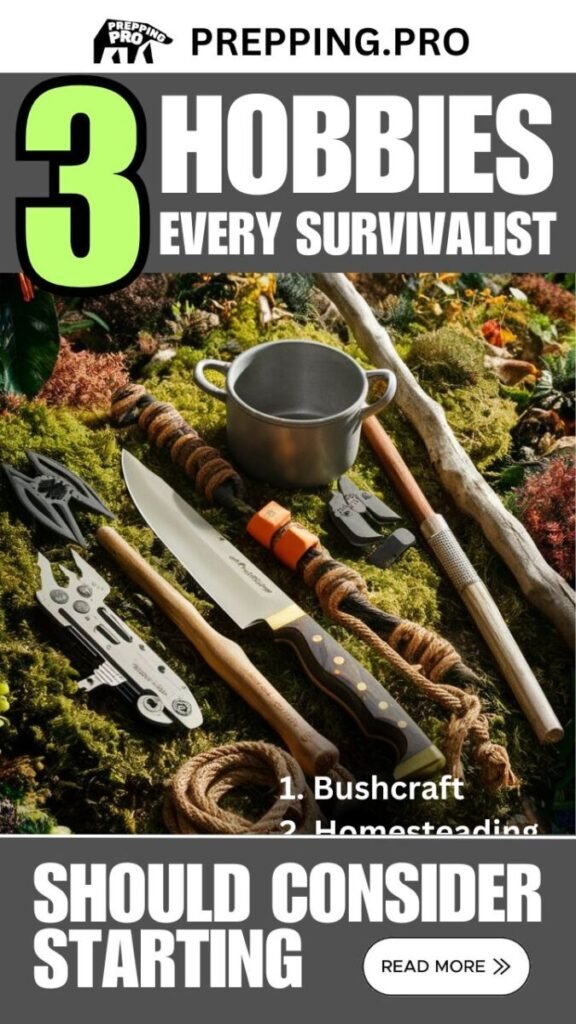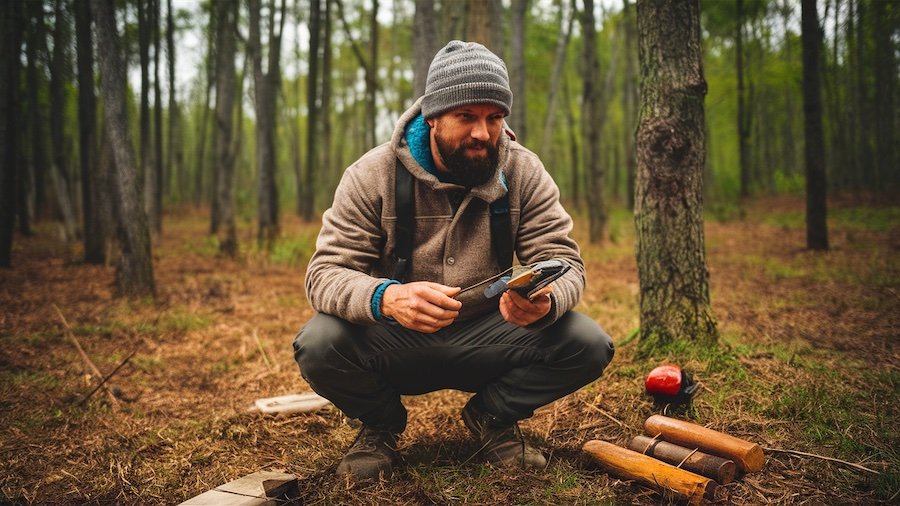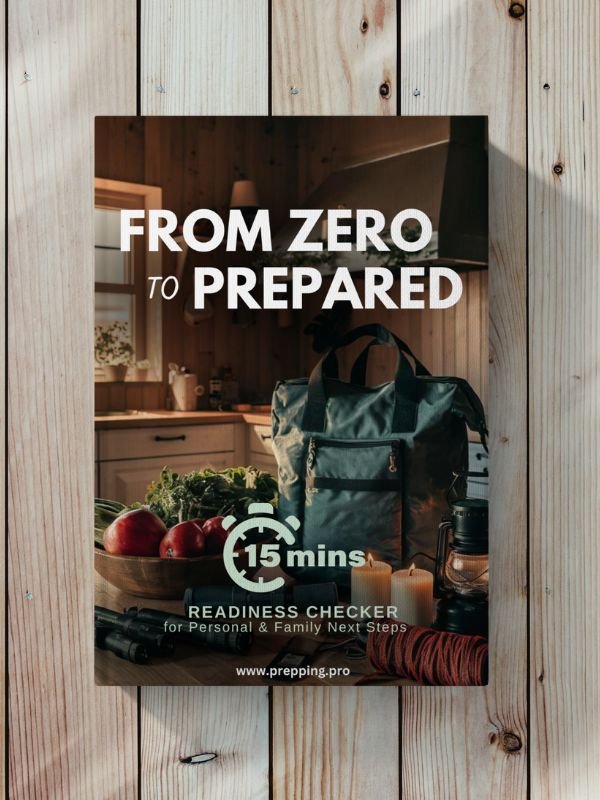Hobbies for survivalists enhance outdoor skills, wilderness survival abilities, and self-reliance.
The top 3 hobbies every survivalist should consider are bushcraft, homesteading, and hunting/fishing.
These activities significantly improve emergency preparedness and provide valuable skills for long-term survival scenarios.
Survivalists understand the importance of continuous skill development. Hobbies for survivalists offer an enjoyable way to hone crucial abilities while preparing for potential emergencies.
This article explores the top three hobbies that every survivalist should consider incorporating into their lifestyle. For a comprehensive list of essential skills for SHTF scenarios, check out our detailed guide.

These hobbies provide:
- Practical skills for wilderness survival
- Increased self-sufficiency
- Improved emergency preparedness
- Enhanced outdoor skills
| Hobby | Primary Benefits | Skill Level |
|---|---|---|
| Bushcraft | Wilderness survival, Self-reliance | Beginner to Advanced |
| Homesteading | Self-sufficiency, Sustainable living | Intermediate to Advanced |
| Hunting/Fishing | Food procurement, Outdoor skills | Beginner to Advanced |
Table of Contents
1. Bushcraft: Mastering Wilderness Survival
Bushcraft forms the foundation of wilderness survival skills. This hobby teaches survivalists how to thrive in natural environments using minimal tools and resources. Bushcraft practitioners develop a deep understanding of nature and learn to work with it, rather than against it.
Key bushcraft skills include:
- Fire-making techniques
- Shelter building
- Water procurement and purification
- Tool crafting from natural materials
- Wild edible identification and foraging
| Bushcraft Skill | Importance | Difficulty Level |
|---|---|---|
| Fire-making | Essential for warmth, cooking, and signaling | Moderate |
| Shelter building | Crucial for protection from elements | Moderate to High |
| Water procurement | Critical for survival in any environment | Moderate |
Fire-making Techniques
Fire-making stands as a cornerstone of bushcraft and survival skills. Survivalists must master multiple methods to ensure they can create fire in any situation. These techniques include:
- Friction-based methods (bow drill, hand drill)
- Ferrocerium rod and striker
- Magnifying glass or lens-based fire starting
- Battery and steel wool technique
Practicing these methods regularly improves proficiency and confidence in fire-making abilities. For more advanced techniques, learn how to build a fire with wet wood or master the upside-down fire technique.
Shelter Building
Shelter protects survivalists from the elements and provides a sense of security in the wilderness. Bushcraft enthusiasts learn to construct various shelter types using natural materials. Common shelter designs include:
- Lean-to shelters
- Debris huts
- Snow caves (in winter environments)
- Natural shelter improvements (caves, hollow logs)
Shelter building skills enhance overall wilderness survival capabilities and boost confidence in outdoor settings.
Water Procurement and Purification
Water remains essential for survival in any environment. Bushcraft practitioners develop skills to locate, collect, and purify water from various sources. These skills include:
- Identifying water sources in different terrains
- Collecting water through condensation or plant transpiration
- Constructing water filters using natural materials
- Purification methods (boiling, chemical treatment, solar disinfection)
Mastering water procurement and purification techniques ensures survivalists can maintain hydration in emergency situations.
2. Homesteading: The Ultimate Self-Reliance Hobby
Homesteading embodies the essence of self-reliance and sustainable living. This hobby teaches survivalists to produce their own food, manage resources efficiently, and reduce dependence on external systems. Homesteading skills prove invaluable during long-term survival scenarios or economic disruptions. For those in urban areas, consider urban homesteading as an alternative.
Essential homesteading skills include:
- Gardening and food preservation
- Animal husbandry
- Off-grid energy production
- Basic construction and repair
- Natural medicine and herbalism
| Homesteading Skill | Benefits | Initial Investment |
|---|---|---|
| Gardening | Sustainable food production, Nutritional control | Low to Moderate |
| Animal Husbandry | Protein source, Byproducts (eggs, milk, wool) | Moderate to High |
| Off-grid Energy | Energy independence, Reduced utility costs | High |
Gardening and Food Preservation
Gardening provides a sustainable source of fresh, nutritious food. Survivalists should focus on:
- Crop selection for their climate and soil type
- Companion planting and natural pest control
- Seed saving for long-term sustainability
- Season extension techniques (greenhouses, cold frames)
Food preservation methods ensure a year-round food supply:
- Canning (water bath and pressure canning)
- Dehydration
- Fermentation
- Root cellaring
Mastering these skills significantly enhances food security and self-sufficiency. For additional food sources, explore edible wild plants in your area.
Animal Husbandry
Raising animals offers numerous benefits for homesteaders and survivalists. Common livestock choices include:
- Chickens for eggs and meat
- Goats or cows for milk and dairy products
- Rabbits for meat and fur
- Bees for honey and pollination
Animal husbandry skills encompass:
- Proper feeding and nutrition
- Health management and basic veterinary care
- Breeding and reproduction
- Humane slaughter and butchering techniques
These skills provide valuable protein sources and animal byproducts for long-term survival situations.

Off-grid Living Techniques
Off-grid living reduces dependence on public utilities and increases resilience during emergencies. Key areas to focus on include:
- Alternative energy sources (solar, wind, micro-hydro)
- Water collection and filtration systems
- Waste management (composting toilets, greywater systems)
- Natural heating and cooling methods
Developing these skills enhances overall self-reliance and preparedness for various scenarios. For a comprehensive guide on transitioning to an off-grid lifestyle, check out our article on going off-grid.
3. Hunting and Fishing: Sustainable Food Procurement
Hunting and fishing provide essential food procurement skills for survivalists.
These activities teach valuable outdoor skills and offer a sustainable source of protein in wilderness or long-term survival situations.
Mastering hunting and fishing techniques significantly improves overall survival capabilities.
Key benefits of hunting and fishing include:
- Sustainable food sources
- Enhanced outdoor awareness
- Improved tracking and stalking skills
- Knowledge of animal behavior and habitats
| Skill | Primary Game/Fish | Best Seasons |
|---|---|---|
| Hunting | Deer, Turkey, Small Game | Fall, Winter |
| Fishing | Bass, Trout, Catfish | Spring, Summer |
| Trapping | Rabbits, Beaver, Muskrat | Fall, Winter |
Developing Hunting Skills
Hunting requires a diverse skill set to be successful and ethical. Survivalists should focus on:
- Tracking and stalking techniques
- Understanding animal behavior and habits
- Proper weapon handling and maintenance
- Field dressing and meat preservation methods
Ethical hunting practices ensure sustainable wildlife management and responsible use of resources. For an alternative hunting method, consider learning survival archery.
Mastering Fishing Techniques
Fishing provides a valuable food source in many environments. Key fishing skills include:
- Various fishing methods (rod and reel, netting, trapping)
- Fish identification and habitat knowledge
- Bait selection and lure crafting
- Cleaning and preserving fish
These skills enhance food procurement abilities in both freshwater and saltwater environments.
For more advanced techniques, explore our guide on fishing skills for post-collapse scenarios.
Trapping for Survival
Trapping offers an efficient method for procuring small game. Important trapping skills include:
- Trap construction and setting
- Understanding animal trails and habits
- Humane dispatching methods
- Fur and hide preparation
Trapping skills complement hunting and fishing, providing additional food procurement options.
Learn about the best survival snares to enhance your trapping abilities.
Integrating the Top 3 Hobbies
Bushcraft, homesteading, and hunting/fishing form a comprehensive skill set for survivalists.
These hobbies complement each other, creating a well-rounded approach to emergency preparedness and self-reliance.
Benefits of integrating these hobbies:
- Diverse skill development
- Increased adaptability to various scenarios
- Enhanced overall survival readiness
- Improved confidence in outdoor environments
| Hobby Combination | Synergistic Benefits |
|---|---|
| Bushcraft + Hunting | Improved tracking, shelter building for hunting camps |
| Homesteading + Fishing | Sustainable food production, composting fish waste for gardens |
| Bushcraft + Homesteading | Natural material use in homestead projects, wild plant knowledge for gardening |
For more ideas on combining survival skills, check out our article on hobbies for survival skills.
Additional Complementary Hobbies
While bushcraft, homesteading, and hunting/fishing form the core of survival hobbies, several additional activities enhance overall preparedness.
Foraging for Wild Edibles
Foraging complements hunting and fishing skills, providing diverse food sources.
Key aspects of foraging include:
- Plant identification skills
- Sustainable harvesting practices
- Nutritional knowledge of wild edibles
- Proper preparation and preservation techniques
Foraging enhances food security and reduces dependence on cultivated or hunted food sources.
Learn more about edible wild plants to expand your foraging knowledge.
Outdoor Navigation and Orienteering
Navigation skills prove crucial for wilderness survival and efficient movement in unfamiliar terrain.
Important navigation skills include:
- Map reading and compass use
- GPS device operation
- Natural navigation methods (using stars, sun, and landmarks)
- Terrain feature identification and interpretation
These skills complement bushcraft and hunting activities, improving overall outdoor competence.
First Aid and Wilderness Medicine
Medical knowledge remains essential for survivalists. Key areas to focus on include:
- Basic first aid and CPR
- Wilderness-specific medical techniques
- Herbal medicine and natural remedies
- Improvised medical tools and equipment
These skills enhance overall survival capabilities and provide valuable assistance in emergency situations.
Getting Started with Survival Hobbies
Survivalists can begin developing these hobbies through various resources and communities.
Actionable steps to get started:
- Join local survival or outdoor skills groups
- Attend workshops and courses on specific skills
- Practice skills regularly in controlled environments
- Invest in quality gear and tools for each hobby
- Build a library of reference materials and guides
| Resource Type | Examples | Benefits |
|---|---|---|
| Books | SAS Survival Handbook, The Encyclopedia of Country Living | In-depth knowledge, offline reference |
| Online Courses | Udemy, Skillshare, Coursera | Structured learning, expert instruction |
| Local Workshops | Community centers, outdoor clubs | Hands-on practice, networking |
For those on a tight budget, explore our guide on budget-friendly survival skills to get started without breaking the bank.
Conclusion
Bushcraft, homesteading, and hunting/fishing form the foundation of essential hobbies for survivalists.
These activities significantly enhance outdoor skills, wilderness survival abilities, and overall self-reliance.
Integrating these hobbies creates a comprehensive approach to emergency preparedness and long-term survival capability.
Survivalists should actively pursue these hobbies to develop a well-rounded skill set.
Regular practice and continuous learning ensure readiness for various survival scenarios.
By embracing these hobbies, individuals not only prepare for potential emergencies but also gain valuable life skills and a deeper connection to the natural world.
For more information on critical survival skills and techniques, explore our comprehensive guides on timeless survival skills and critical survival skills.


